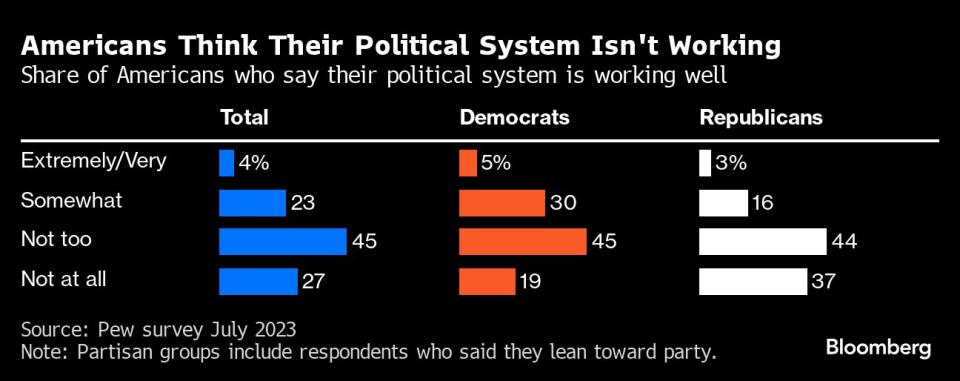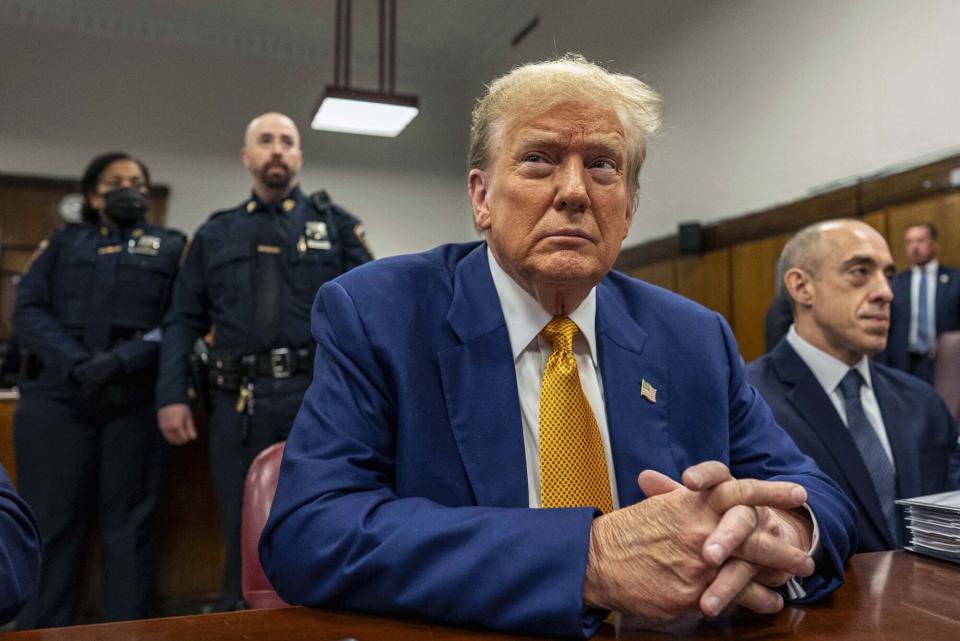Trump’s Persecution Claims Get Boost from Russia, China
(Bloomberg) -- After Donald Trump’s felony conviction last week, commentators in China and Russia wasted little time in trumpeting the failure of American democracy.
Most Read from Bloomberg
Modi Vows to Retain Power Even as Party Loses India Majority
Short Sellers in Danger of Extinction After Crushing Stock Gains
Bonds Rally as Traders Reload Fed Bets After Data: Markets Wrap
Stock Pickers Defy Wall Street Norm to Risk It All on a Few Bets
Intel CEO Takes Aim at Nvidia in Fight for AI Chip Dominance
Chinese social media users reacted with bemusement, urging Trump supporters to again storm the US Capitol and warning of a civil war. State-run CCTV called the upcoming election a “farce.” Kremlin press secretary Dmitry Peskov said “the entire world” could see Trump was being persecuted “by all possible lawful and unlawful means.”
Of course, Russia and China have long blasted the US system. But this time, their claims echoed those of Republican legislators following last week’s criminal trial that found Trump guilty of all 34 counts of falsifying business records to conceal a hush-money payment to a porn star. Even high-ranking lawmakers from Trump’s party described the process as “weaponization of our justice system,” and in some cases vowed to do turn judicial scrutiny on Democrats.
The global fallout from Trump’s guilty verdict just months before he contests the next presidential election will test the US’s already battered efforts to position itself as a beacon for democracy with illiberalism on the rise. While the conviction of a former — and possibly future — president is unprecedented in the US, other democracies like Brazil, Israel, South Korea, Italy and France have put their own former leaders on trial.
Over the past 15 years, the share of the world’s population living under autocratic regimes has surpassed those in democratizing countries, with stark declines in democratic governance particularly in Eastern Europe and parts of Asia, according to data by the V-Dem Institute.
A February report from the Pew Research Center in Washington found that the share of people who view representative democracy as a very good way to be governed has fallen since 2017 in half of the 22 countries surveyed.
But for governments in Ukraine, Taiwan, the Philippines and the Balkans, the concern is less with the strength of the US’s own democracy and more the assurance that any American leader, including Trump, is committed to helping defend them against aggression from Vladimir Putin or Xi Jinping, for the simple fact that there is no credible alternative.
“No matter who is the president of the United States, whether he be a saint or a sinner, we have to deal with the president,” said Kishore Mahbubani, a top bureaucrat in Singapore’s Foreign Ministry from 1993- 1998 and a former president of the UN Security Council.
“I suspect that all the allies of the United States in this region, including Japan, South Korea, Australia, Philippines, all have to deal with a much more transactional president who will ask each one of them ‘What’s in it for me,’” he added.
This question loomed over the weekend in Singapore, where global defense chiefs met for an annual summit. A bipartisan delegation of US lawmakers attended the summit and visited Taiwan to lend support to new President Lai Ching-te, after China last month conducted its largest military exercises in a year. The Republican in the group, Senator Dan Sullivan, echoed that message but also picked up his party’s refrain on the Trump verdict, saying in a statement that the ruling “pushes our great nation even further into banana republic territory.”
The concerns about US reliability aren’t limited to Asia.
The economic emergence of middle powers — seen recently in the expansion of BRICS, a group that now includes nine countries including Brazil, India, China and Russia — has strengthened the hand of nationalists who score political points at home by standing up to lecturing by the US. India last month fired back at criticism from the US over the arrest of an opposition leader before the election, saying the remarks could set “unhealthy precedents.”
“It is the relative decline of the US that makes it less and less able to push back,” said Shahriman Lockman, a senior researcher at the Institute of Strategic and International Studies in Malaysia.
Analysts contend that US soft power has been eroding for decades, undercut by actions like the second Iraq war, the global financial crisis and continuing racial tensions — issues which China has cited to rebut US criticism of the Communist Party.
Democrats contend Trump’s trial is an example of US institutions working as they should — holding even powerful people to account when they commit crimes. Republicans have argued that the charges weren’t serious enough to merit felony convictions. Trump will be allowed to appeal his verdict, and the New York state prosecutors who charged him have already been called to testify before Congress.
Dozens of senior US politicians from both parties have been convicted by the country’s independent judiciary since 2001, according to Nicole Bibbins Sedaca, interim president of Freedom House, a Washington-based organization dedicated to defending democracy.
“We see this not as a political undertaking, but as a sign that a democratic system is working,” Bibbins Sedaca said. “Our hope is also that this can be seen as democracy in action and a way to strengthen the trust in our democracy and the trust in rule of law.”
--With assistance from Jing Li, Ben Westcott, Josh Xiao and Tony Halpin.
Most Read from Bloomberg Businessweek
Startup Brings New Hope to the Pursuit of Reviving Frozen Bodies
The Budget Geeks Who Helped Solve an American Economic Puzzle
Disney Is Banking On Sequels to Help Get Pixar Back on Track
How Rage, Boredom and WallStreetBets Created a New Generation of Young American Traders
©2024 Bloomberg L.P.

 Yahoo News
Yahoo News 



